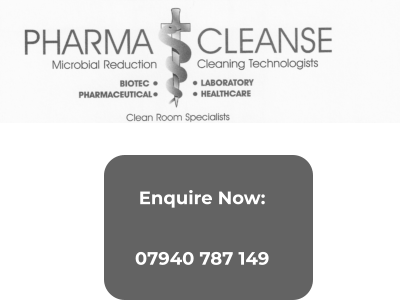
VIlldale Ave, Stockport. SK2 5SQ.
© PHARMACLEANSE Ltd
Cleanroom
Maintenance &
Best Practices:
An In-Depth
Guide for Optimal
Performance
Cleanroom Maintenance & Best Practices: A Comprehensive Guide
Maintaining cleanroom integrity is crucial for various industries such as pharmaceuticals, biotechnology, electronics,
and medical devices. A well-maintained cleanroom ensures that products and processes meet the highest standards
for quality and safety. In this in-depth guide, we will explore the best practices for cleanroom maintenance to help you
achieve optimal performance and compliance in your controlled environment.
Regular Cleaning & Monitoring
Regular cleaning and monitoring are vital for maintaining a clean and compliant cleanroom. Develop and follow a
cleaning schedule based on your cleanroom’s classification, usage, and industry requirements. Monitor particle counts,
temperature, humidity, and other parameters to ensure optimal cleanroom conditions.
Key points:
1.
Create a cleaning schedule.
2.
Monitor particle counts and environmental parameters.
3.
Adjust cleaning frequency based on cleanroom usage and requirements.
Cleanroom-Approved Cleaning Agents & Equipment
Using cleanroom-approved cleaning agents and equipment is essential for preventing contamination and ensuring
cleanliness. Choose cleaning products specifically designed for cleanrooms and follow the manufacturere’s guidlines.
Utilize equipment, such as vacuum cleaners with HEPA filters and lint-free wipes, that are designed for cleanroom use.
Key points:
1.
Select cleanroom-approved cleaning agents.
2.
Follow manufacturer guidelines for product usage.
3.
Use cleanroom-specific equipment.
Proper Gowning Procedures
Adhering to proper gowning procedures is critical for preventing contamination in cleanrooms. Train staff on proper
gowning techniques, and ensure they follow these procedures consistantly. Implement a gowning protocol that
includes donning and doffing cleanroom garments, gloves, and other personal protective equipment (PPE).
Key points:
1.
Train staff on gowning procedures.
2.
Implement a gowning protocol.
3.
Ensure consistent adherence to gowning procedures.
Preventative Maintenance & Equipment Calibration
Conduct regular preventative maintenance and calibration of cleanroom equipment, such as air handling units, filters,
and monitoring devices, to ensure optimal performace. Schedule routine maintenance and calibration based on the
manufacturer’s recommendations and your cleanroom’s requirements.
Key points:
1.
Perform preventative maintenance on cleanroom equipment.
2.
Calibrate monitoring devices regularly.
3.
Follow Manufacturer recommendations for maintenance and calibration schedules.
Maintaining a clean and compliant cleanroom environment is essential for the sucess of your operations. Implementing
these best practices will help you achieve optimal performance and maintain the highest standards of quality and safety.
For more information or assistance in developing a customized cleanroom maintenance plan, contact our team of
experts. We’re here to help you ensure your cleanroom is always performin at its best.
Staff Training & Awareness
Ensure taht all staff working in the cleanroom are properly trained and aware of the importance of cleanliness and
contamination control. Conduct regular training sessions on cleanroom protocols, procedures, and best practices.
Encourage a culture of cleanliness and compliance among staff members.
Key points:
1.
Train staff on cleanroom protocols and best practice.
2.
Maintain a culture of cleanliness and compliance.
3.
Conduct ongoing training and awareness programs.


© Pharmacleanse Ltd
Cleanroom Maintenance & Best
Practices: A Comprehensive Guide
Maintaining cleanroom integrity is crucial for
various industries such as pharmaceuticals,
biotechnology, electronics, and medical devices. A
well-maintained cleanroom ensures that products
and processes meet the highest standards for
quality and safety. In this in-depth guide, we will
explore the best practices for cleanroom
maintenance to help you achieve optimal
performance and compliance in your controlled
environment.
Regular Cleaning & Monitoring
Regular pharmaceutical cleaning and monitoring
are vital for maintaining a clean and compliant
cleanroom. Develop and follow a cleaning
schedule based on your cleanroom’s classification,
usage, and industry requirements. Monitor
particle counts, temperature, humidity, and other
parameters to ensure optimal cleanroom
conditions.
Key points:
1.
Create a cleaning schedule.
2.
Monitor particle counts and environmental
parameters.
3.
Adjust cleaning frequency based on
cleanroom usage and requirements.
Cleanroom Approved Cleaning
Agents & Equipment
Using cleanroom approved cleaning agents and
equipment is essential for preventing
contamination and ensuring cleanliness. Choose
cleaning products specifically designed for
cleanrooms and follow the manufacturere’s
guidlines. Utilize equipment, such as vacuum
cleaners with HEPA filters and lint-free wipes, that
are designed for cleanroom use.
Key points:
1.
Select cleanroom-approved cleaning agents.
2.
Follow manufacturer guidelines for product
usage.
3.
Use cleanroom-specific equipment.
Proper Gowning Procedures
Adhering to proper gowning procedures is critical
for preventing contamination in cleanrooms. Train
staff on proper gowning techniques, and ensure
they follow these procedures consistantly.
Implement a gowning protocol that includes
donning and doffing cleanroom garments, gloves,
and other personal protective equipment (PPE).
Key points:
1.
Train staff on gowning procedures.
2.
Implement a gowning protocol.
3.
Ensure consistent adherence to gowning
procedures.
Preventative Maintenance &
Equipment Calibration
Conduct regular preventative maintenance and
calibration of cleanroom equipment, such as air
handling units, filters, and monitoring devices, to
ensure optimal performace. Schedule routine
maintenance and calibration based on the
manufacturer’s recommendations and your
cleanroom’s requirements.
Key points:
1.
Perform preventative maintenance on
cleanroom equipment.
2.
Calibrate monitoring devices regularly.
3.
Follow Manufacturer recommendations for
maintenance and calibration schedules.
Staff Training & Awareness
Ensure taht all staff working in the cleanroom are
properly trained and aware of the importance of
cleanliness and contamination control. Conduct
regular training sessions on cleanroom protocols,
procedures, and best practices. Encourage a
culture of cleanliness and compliance among
staff members.
Key points:
1.
Train staff on cleanroom protocols and best
practice.
2.
Maintain a culture of cleanliness and
compliance.
3.
Conduct ongoing training and awareness
programs.
Maintaining a clean and compliant cleanroom
environment is essential for the sucess of your
operations. Implementing these best practices
will help you achieve optimal performance and
maintain the highest standards of quality and
safety. For more information or assistance in
developing a customized cleanroom maintenance
plan, contact our team of experts. We’re here to
help you ensure your cleanroom is always
performin at its best.











